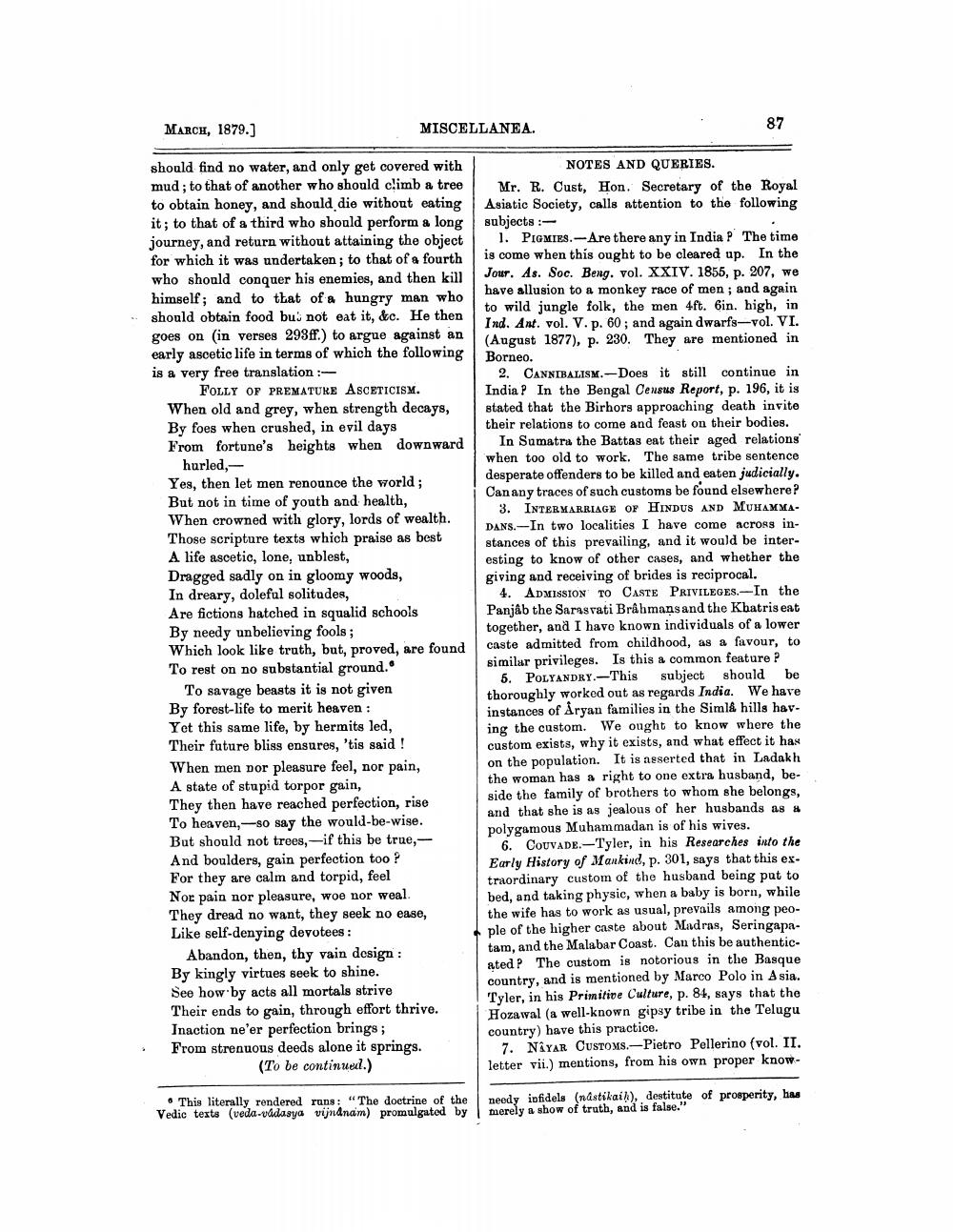________________
MARCH, 1879.]
MISCELLANEA.
87
should find no water, and only get covered with mud; to that of another who should climb a tree to obtain honey, and should die without eating it; to that of a third who should perform a long journey, and return without attaining the object for which it was undertaken; to that of a fourth who should conquer his enemies, and then kill himself; and to that of a hungry man who should obtain food buj not eat it, &c. He then goes on (in verses 293ff.) to argue against an early ascetic life in terms of which the following is a very free translation:
FOLLY OF PREMATURE ASCETICISM. When old and grey, when strength decays, By foes when crushed, in evil days From fortune's heights when downward
hurled, - Yes, then let men renounce the world; But not in time of youth and health, When crowned with glory, lords of wealth. Those scripture texts which praise as best A life ascetic, lone, unblest, Dragged sadly on in gloomy woods, In dreary, doleful solitudes, Are fictions hatched in squalid schools By needy unbelieving fools; Which look like truth, but, proved, are found To rest on no substantial ground.
To savage beasts it is not given By forest-life to merit heaven: Yet this same life, by hermits led, Their future bliss ensures, 'tis said ! When men por pleasure feel, nor pain, A state of stupid torpor gain, They then have reached perfection, rise To heaven, --so say the would-be-wise. But should not trees, --if this be true, And boulders, gain perfection too? For they are calm and torpid, feel Nor pain nor pleasure, woe nor weal. They dread no want, they seek no ease, Like self-denying devotees :
Abandon, then, thy vain design: By kingly virtues seek to shine. See how by acts all mortals strive Their ends to gain, through effort thrive. Inaction ne'er perfection brings; From strenuous deeds alone it springs.
(To be continued.)
NOTES AND QUERIES. Mr. R. Cust, Hon. Secretary of the Royal Asiatic Society, calls attention to the following subjects :
1. Piomies.- Are there any in India P The time is come when this ought to be cleared up. In the Jour. As. Soc. Beng. vol. XXIV. 1855, p. 207, we have allusion to a monkey race of men ; and again to wild jungle folk, the men 4ft. 6in. high, in Ind. Ant. vol. V. p. 60; and again dwarfs-vol. VI. (August 1877), p. 230. They are mentioned in Borneo.
2. CANNIBALISM.-Does it still continue in India? In the Bengal Census Report, p. 196, it is stated that the Birhors approaching death invite their relations to come and feast on their bodies.
In Sumatra the Battas eat their aged relations when too old to work. The same tribe sentence desperate offenders to be killed and eaten judicially. Can any traces of such customs be found elsewhere?
3. INTER MARRIAGE OF HINDUS AND MUHAMMADANS.-In two localities I have come across instances of this prevailing, and it would be interesting to know of other cases, and whether the giving and receiving of brides is reciprocal.
4. ADMISSION TO CASTE PRIVILEGES.-In the Panjab the Sarasvati Brahmans and the Kbatris eat together, and I havo known individuals of a lower caste admitted from childhood, as a favour, to similar privileges. Is this a common feature
5. POLYANDRY.-This subject should be thoroughly worked out as regards India. We have instances of Aryan families in the SimlA hills hav. ing the custom. We ought to know where the custom exists, why it exists, and what effect it has on the population. It is asserted that in Ladakh the woman has a right to one extra husband, beside the family of brothers to whom she belongs, and that she is as jealous of her husbands as # polygamous Muhammadan is of his wives.
6. COUVADE.-Tyler, in his Researches into the Early History of Mankind, p. 301, says that this ex. traordinary custom of the husband being put to bed, and taking physic, when a baby is born, while the wife has to work as usual, prevails among people of the higher caste about Madras, Seringapatam, and the Malabar Coast. Can this be authenticated? The custom is notorious in the Basque country, and is mentioned by Marco Polo in Asia. Tyler, in his Primitive Culture, p. 84, says that the Hozawal (a well-known gipsy tribe in the Telugu country) have this practice.
7. NAYAR CUSTOMS. Pietro Pellerino (vol. II. letter vii.) mentions, from his own proper know
This literally rendered runs: "The doctrine of the Vedic texts (veda-vudasya vündnam) promulgated by
needy infidels (nastikail), destitute of prosperity, has merely a show of truth, and is false."




